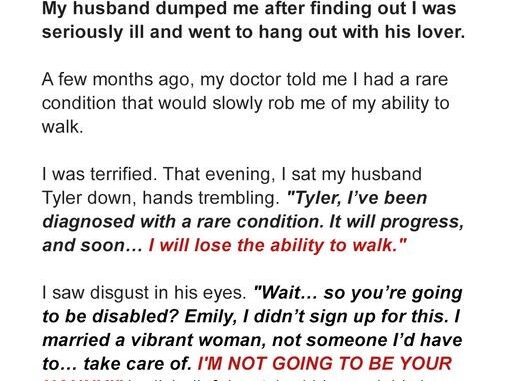
When Emily met with her doctor, her life turned upside down. Dr. Duncan’s words were careful but unflinching. “Emily, the results indicate Charcot-Marie-Tooth disease. It’s a rare neurological disorder that will gradually affect your mobility. Over time, even walking may become difficult.”
Numb and struggling to absorb the weight of the diagnosis, Emily left the clinic. She wandered through a nearby park, cherishing the simple act of walking, aware that it might soon be taken from her. That night, she decided to tell her husband, Tyler. Hoping for compassion, she waited until after dinner, choosing her words carefully.
“Tyler, I need to tell you something important.” She explained her diagnosis, the potential for losing her ability to walk, and her fears about the future. Tyler’s reaction, however, was cold and unrecognizable. “What, you expect me to push you around in a wheelchair?” he scoffed. His words cut deep, revealing a selfishness she hadn’t known existed. Tyler left her that night, leaving only a note: Need time to think.
For days, he didn’t reach out. Emily confided in her sister Audrey, who reassured her that family would stand by her no matter what. As she scrolled through social media, Emily’s heart sank. A photo showed Tyler laughing on a beach with another woman, as if Emily had already become a memory.
A week later, Dr. Duncan called with startling news. “Emily, there’s been a mistake in your results. You’re healthy. We’ll just need to monitor your calcium levels.”
Relief mingled with anger. Tyler had abandoned her at her lowest. Weeks later, after her grandmother passed, Emily received an unexpected inheritance, giving her the freedom to move forward on her own. Right on cue, Tyler appeared, feigning remorse. Holding a bouquet of wilted flowers, he stammered about wanting her back. But Emily had found strength and clarity in his absence. She opened the door wider, signaling his exit, and said with finality, “I deserve better.”
Leave a Reply